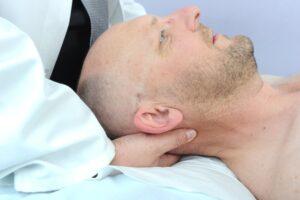If you’re experiencing headaches somewhere on the head with all sinister causes having been ruled out, then it’s possible you’ve got a tension headache – read on to find out what they are, how you might be able to prevent them and what you might be able to do about getting rid of them if you get one.

Part of the Pain Relief Series of blog posts
Tension Headache
Tension headache is the most common type of headache people experience. It’s difficult to say precisely how common, as estimates from different studies have varied wildly, but most people will have a tension headache at some point in their lives.
Those studies which have tried to determine how many people experience tension headaches suggest that:
Somewhere around half of adults experience tension headaches at least every month, and about 1 in 30 adults experience chronic tension headaches (headaches on more than half of the days for three months or more) – although some of these cases may be medication-overuse headaches (medication-induced headaches) and it may therefore be an overestimation.
Tension headaches are called episodic tension headaches if they occur on less than half of the days in a month. They are called chronic tension headaches if they occur more than half of the time.
Symptoms & causes of a tension headache
Tension headaches are usually felt as a band of pain across the forehead and are usually easier in the morning and worsen throughout the day.

They can last for anything from a few hours to several days, although a few hours is most common. They can be uncomfortable and tiring, but they do not usually disturb sleep.
Most people can carry on working with a tension headache. They are not usually made worse by physical activity, although it’s not unusual to be a bit sensitive to bright light or noise.
They are usually caused by poor work/social posture, fatigue, stress, anxiety and over consumption of alcohol or caffeine. Eye strain, hunger and extremes of heat/cold/sunlight can also cause them
There are usually no other symptoms. Some people don’t like bright lights or loud noises, and don’t feel like eating much when they have a tension headache.
Are any other headaches similar to tension headache?
Some common conditions can cause a headache similar to a tension headache. These include a high temperature (fever), which may cause a similar headache. A similar headache is also common if you don’t have caffeine for a while when you were used to drinking lots of caffeine-rich drinks, such as a lot of coffee. This is a caffeine withdrawal headache.
How can I be sure it is not a more serious type of headache?
With tension headaches, you are normally well between headaches, and have no other ongoing symptoms. Upon examination, if nothing is found to be abnormal (apart from some tenderness of the muscles around the head/neck area when a headache is present), then tests are not needed unless you have unusual symptoms, or something other than tension headache is suspected.
The kind of symptoms that might make us suggest you get further tests via a doctor to make absolutely sure your headache is not serious include:
- If you have had a significant head injury in the previous three months.
- If your headaches are worsening and accompanied by high temperature (fever).
- If your headaches start extremely suddenly.
- If you have developed problems with speech and balance as well as headache.
- If you have developed problems with your memory or changes in your behaviour or personality as well as headache.
- If you are confused or muddled with your headache.
- If your headache started when you coughed, sneezed or strained.
- If your headache is worse when you sit or stand.
- If your headache is associated with red or painful eyes.
- If your headaches are not like anything you have ever experienced before.
- If you have unexplained sickness (vomiting) with the headache.
- If you have low immunity – for example, if you have HIV, or are on oral steroid medication or medicines which suppress the immune system.
- If you have or have had a type of cancer that can spread through the body.
Can I prevent frequent/chronic tension headaches?
Diary
It may help to keep a diary if you have frequent headaches. Note when, where and how bad each headache is, and how long each headache lasts. Also note anything that may have caused it. A pattern may emerge and you may find a trigger to avoid. For example, hunger, eye strain, bad posture, stress, anger, etc. Also try to take note of things that made it better, and things that were different on the days you were well, which may help point to a clue regarding what was wrong.
Stress
Stress is a trigger for some people who develop tension headaches.
Avoid stressful situations whenever possible.
Sometimes a stressful job or situation cannot be avoided.

Learning to cope with stress and to relax may help. This can include using breathing and relaxation exercises, or coping strategies. All of these may ease anxiety in stressful situations and prevent a possible headache. There are apps such as those provided by Headspace which have free trials. It’s possible that these can help you to relax although on their own. A referral to a counsellor or psychologist may be advisable for some people though.
Regular exercise
Some people with frequent headaches say that they have fewer headaches if they exercise regularly. Conversely, tension headaches can actually stop you from wanting to exercise too. If you do not do much exercise, it may be worth trying some regular activities like brisk walking, jogging, cycling, swimming, etc. This will have other health benefits, apart from helping with headaches.
According to research, exercise is thought to help ease stress and tension in people who suffer migraines, which may also have a similar effect in reducing tension headaches.
Medication
We aren’t doctors or pharmacists and so aren’t allowed to advise what medication you should be using for pain relief. Decide that for yourself by looking for advice on the NHS website or consulting your doctor if need be.
That being said, we can outline medications advised by doctors to help reduce the pain of tension headaches.
Amitriptyline is the medicine most commonly used to prevent tension headaches. This is not a painkiller and so does not take away a headache if a headache develops. The main problem with amitriptyline is that you have to take it regardless of whether you currently have a headache or not, as it works to prevent and not reduce the headache itself if you still end up getting one. You may well still get a headache whilst taking the medication, as headache is one of the side effects of taking amitriptyline, along with constipation, dizziness, dry mouth, feeling sleepy and a difficulty peeing1.
Osteopathy

Osteopathy can be used semi-regularly to keep yourself in optimal mechanical shape and reduce any overstrains in the head and neck area. These strains can lead to tension headache, often caused by computers, driving position, plus the use of tools and machinery.
How often you will need to come in for an ‘MOT’ with us will depend on each individual and their life circumstances (work, social habits, etc), but as a general rule, once your headaches have stabilised (when you’re not in the acute and active phase of the headache) then in our experience, people generally benefit most by having an Osteopathy session once every 4-6 weeks. This figure of 4-6weeks is backed up by research conducted by the National Council for Osteopathic Research (NCOR) in their Patient Reported Outcome Measures (PROMS) study. This study found that of all the patients surveyed (1721 patients), 93.5% reported a very good experience & 92.8% reported a good improvement, all at six weeks post-treatment.
Treatments for tension headache
Lifestyle
The best approach is to try to work out what triggers your headache and making some changes in lifestyle. Taking a walk, doing some general exercise, or simply taking a break from the normal routine may help.
Osteopathic treatment to your neck and shoulder may help as there is good evidence that it works (see below). You can also try a hot flannel on your neck or a warm bath. Also, try to drink less caffeine and more water. Try to have a sensible diet where you eat regularly and have a good balance of slow-release energy foods. Avoiding lots of sugars will help too.
Reducing the number of pillows you sleep on can sometimes help, particularly if you sleep on more than two pillows. Sleeping on your side with high pillows bends your neck which can cause tension, increasing your likelihood of getting headache.
Other ways to avoid tension headaches are by having plenty of sleep and avoiding excessive noise.
Occasionally, tension headaches are caused by reading in low light for long periods.
Painkillers
We aren’t doctors or pharmacists and so aren’t allowed to advise what medication you should be using for pain relief. Decide that for yourself by looking for advice on the NHS website or consulting your doctor if need be.
That being said, we can outline medications advised by doctors to help reduce the pain of tension headaches. Note: you should not take painkillers for headache for more than a couple of days at a time. Also, on average, do not take them for more than two days in any week for headaches. Come to us first and if necessary, we’ll refer you to your doctor for further examination. If you take them more often, you may develop medication-overuse headache (medication-induced headache). Do not take painkillers to prevent headaches, take each day as it comes.
Osteopathy
Research has found that the Spinal Manipulative Therapy (SMT) as used in Osteopathy, is an effective treatment in the management of cervicogenic headache (another name given to describe a cause of tension headaches).
Furthermore, another study concluded that manipulation and soft tissue stretching to the upper neck as used in Osteopathy, resulted in decreased incidence of tension headache and decreased disability due to tension headaches.
There are many ways that your neck and head relationship can be altered, thus leading to increased tension in the neck and scalp muscles and so to tension headaches. Your Osteopath Phil Wise at Baks Osteopathy has helped many people suffering from tension headaches with some quite remarkable results, ranging from the alleviation of seriously debilitating chronic tension headaches, to the complete resolution of acute tension headaches. Osteopathy really can make such a difference, and if you are one of those people who suffers with them, you’ll no doubt be pleased to hear of these successes.
Summary
Whichever method of treatment you choose to help you with your tension headaches, remember that the benefits of Osteopathy can be far greater than just relieving your headaches and neck pain. An example of this is how Osteopathy has been proven to affect our gut, and in particular how it decreases the severity of symptoms in those with Irritable Bowel Syndrome. There is also research showing how Osteopathy improves the ability of those with chronic lung diseases to improve their activity tolerances, so you can see that the power of Osteopathy is far reaching in our bodies and not just good for pain relief – though we do a pretty good job of that, I have to say.
If you would like to know if we can help you, then contact us
Information in the above blog post was taken and summarised from the Patient Info website.
